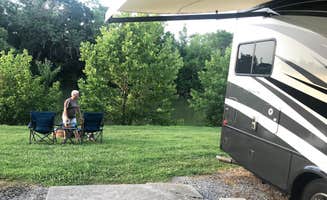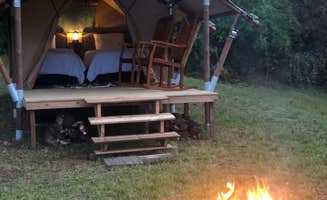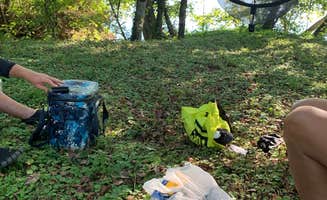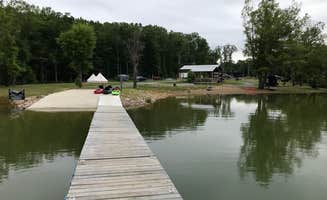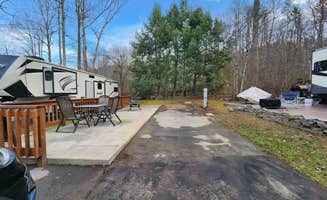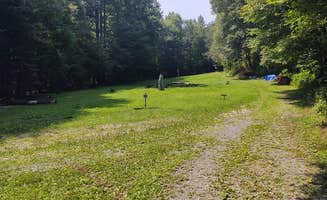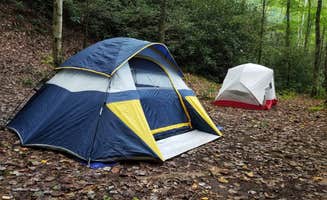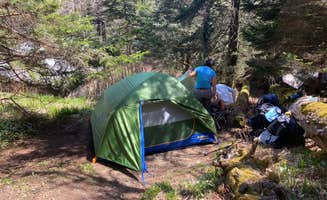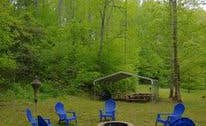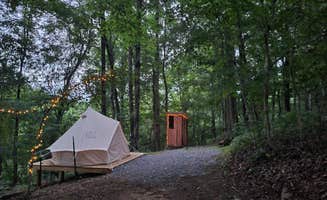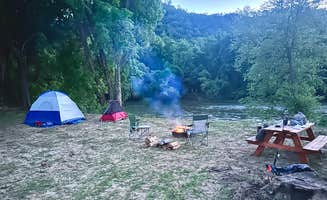Tent camping opportunities near Sevierville, Tennessee extend beyond Great Smoky Mountains National Park to include several lakeside options along Douglas Lake at elevations ranging from 900-1,000 feet. The region typically experiences mild spring and fall temperatures between 60-75°F, with summer highs often exceeding 85°F and high humidity. Camping season runs primarily from April through October, with many campgrounds closing during winter months due to freezing temperatures and occasional snowfall.
What to do
Hiking to waterfalls: Several trails accessible from Cosby Campground lead to scenic water features. "There is a Mount Cammerer Trailhead right there, which is a fabulous hike. There is a stream nearby also!" notes Jessica L. The trails range from moderate 2-3 mile loops to challenging 8+ mile routes with significant elevation gain.
Swimming in natural pools: During summer months, Big Creek Campground offers access to popular swimming holes. "Even though it rained we had a great hike. The falls were beautiful, and jumping into Midnight Hole was fun," shares Chris M. The swimming areas feature clear mountain water with temperatures ranging from 55-65°F depending on season.
Fishing for trout: The French Broad River and adjacent streams offer excellent fishing opportunities within 30 minutes of Sevierville. "Easy to get from Knoxville without going into the craziest part of traffic in Sevierville. There are many RV sites and cabins along the bend of the Little Pidgeon River," reports Jeff T. from Riverside RV Park. Fishing licenses cost $7-$14 for short-term visitors and can be purchased online or at local tackle shops.
What campers like
Quieter alternatives to popular spots: Many campers appreciate the less crowded options. "Cosby Campground tends to be a little quieter than Cades Cove or Elkmont, but I like it that way! There is ample parking nearby and trailheads," writes Jessica L. Visitor counts at Cosby can be 50-70% lower than at the park's most popular campgrounds during peak season.
On-site trailhead access: Tricorner Knob Shelter offers direct trail connections. "The area around the shelter is high, rocky, and remote. Expect 10-15 degrees less than the Park headquarters. There are no less than seven peaks over 6k feet an easy hike from the shelter," explains Bill S. Most sites require permits costing $4 per person per night obtained through the park's reservation system.
Waterfront camping options: Sites along Douglas Lake provide alternatives to mountain camping. "Convenient to highway 66 that runs from Interstate 40 to Sevierville. Not particularly charming, but seems to be clean and well run," notes Seth P. about Riverside RV Park. Lakeside sites typically cost $25-45 per night depending on season and amenities.
What you should know
Limited availability at peak times: Many campgrounds fill quickly during summer weekends and fall color season. "Was directed to Cosby by a NPS Ranger as an overlooked, beautiful campground. Arrived close to dark and had our pick of gorgeous, wooded sites - even on a weekend in July," shares Tricia L. Reservations open 6 months in advance for national park campgrounds.
Varying shower facilities: Mount LeConte Shelter and most backcountry sites lack showers entirely. "I'm a reluctant camper and hiker doing this to spend time with my family. My pack weighed at least 30lbs and I'm new to this, so it took me forever to get up here," notes Michelle F. Plan for 3-5 day intervals between shower access when backcountry camping.
Bear safety requirements: All camping areas enforce strict food storage policies. "To safeguard against bear encounters, bear cables were available and necessary to hang all food overnight," reports Asher K. Bear canisters or hanging food 10+ feet off the ground and away from tent areas is mandatory throughout the region.
Tips for camping with families
Choose sites with swimming access: Kids particularly enjoy campgrounds with water features. "We spent one day simply enjoying the campground. There are some trails nearby but most of the popular hikes you'll need to drive to," recommends Alison W. about Big Creek Campground. Water depth at swimming holes varies seasonally from 2-5 feet in most areas.
Look for ranger programs: Educational opportunities enhance family camping experiences. "Within the campgrounds are several hiking trails for a variety of hiking abilities. On Fridays they have special Ranger programs. We were lucky enough to learn about moon-shining from guys on the moonshiner TV show," shares Janine B. Programs typically last 30-60 minutes and are free with campground stay.
Consider glamping options: For families new to camping, GlampKnox offers a comfortable introduction. "The glamping tent is very high quality, with a covered porch, two comfy beds, and a wood-burning stove, so camping is possible year-round," explains Nate H. Glamping accommodations typically cost $75-150 per night compared to $20-30 for standard tent sites.
Tips from RVers
Plan for limited hookups: Many scenic campgrounds lack full RV facilities. "Easy to get from Knoxville without going into the craziest part of traffic in Sevierville. There are many RV sites and cabins along the bend of the Little Pidgeon River," notes Jeff T. Most RV sites outside private campgrounds offer water only or no hookups.
Consider seasonal access: Lakeside Getaway on Douglas provides easier access for larger vehicles. "Super easy booking, great host communication. This is brand new lakefront campground with tent and RV sites. Currently there are no hookups, conveniently located off I40 and a perfect place to overnight for us," shares Carolin C. The lakeside campgrounds typically maintain level access roads that accommodate rigs up to 35 feet.
Research dump station locations: Many campgrounds lack on-site dump facilities. "Sites are limited and must be reserved through the phone or website," explains Todd R. about Big Creek Campground. The nearest dump stations to most primitive camping areas are often 10-15 miles away at private campgrounds or visitor centers.


